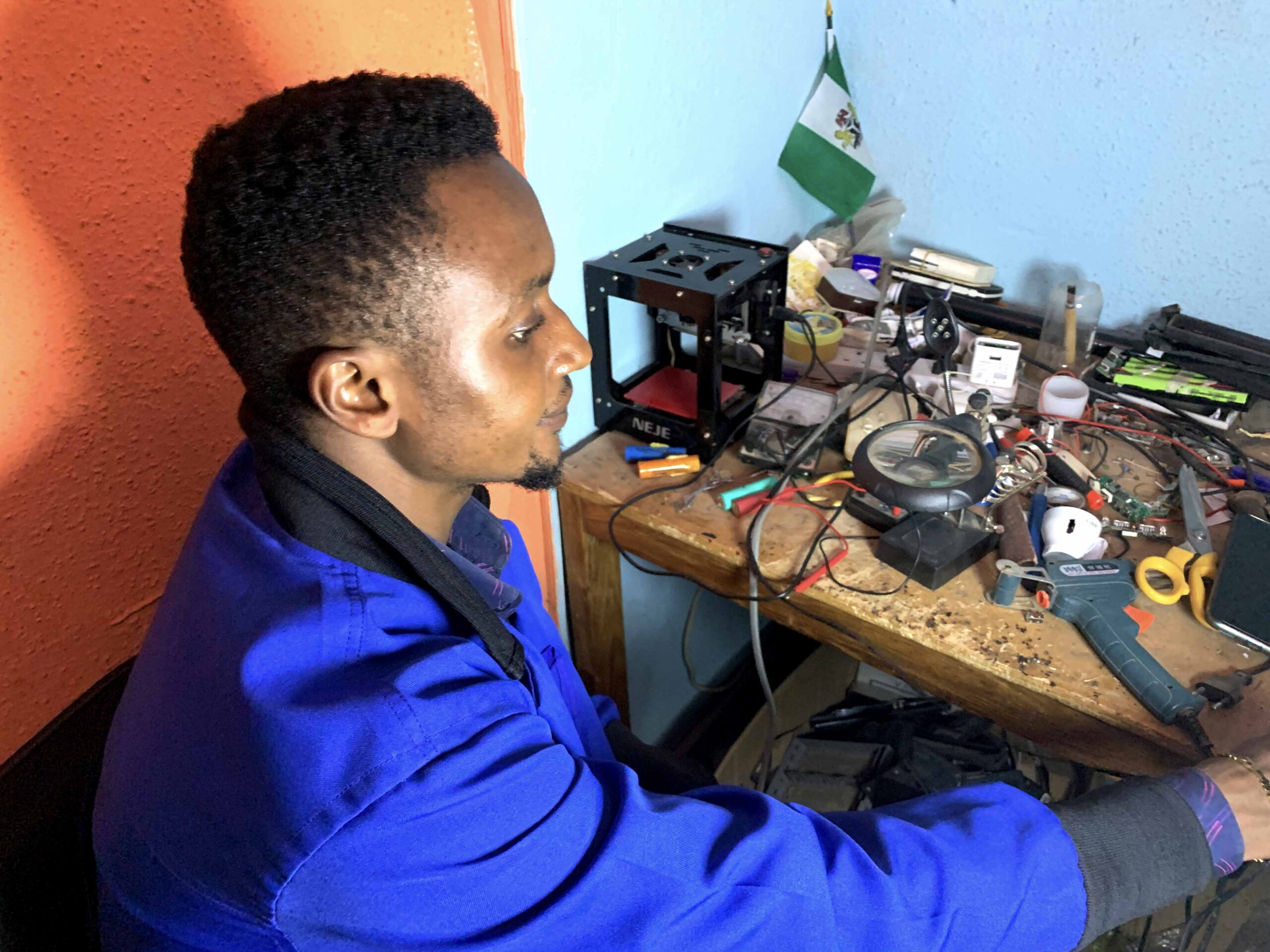By Dorcas Bello
Peering into the gutters of many modern African cities, one comes across a stream of plastic and nylon waste, from plastic bags to discarded water bottles, all clogging up the drainage system. Many of those items end up in dumpsites, creating mountains of waste.
But in Jos, Nigeria, tech-enthusiast Zag Luka Bot, 29, is turning discarded tech in that mountain of trash, into cash. His ingenious innovation of making power banks out of used laptop batteries is not only helping the environment but also offers insight into how to find solutions for one of Africa’s pressing nightmares: what to do with all the garbage.
Miffed by the government’s failure to combat electronic waste pollution, Luka, the chief executive of Zang Technologies, seized the opportunity to make a difference by extracting useful components from electronic waste, to build gadgets.
The initiative comes on the back of Nigeria’s many power outages, when millions are struggling to charge their phones.
“With this power bank I am solving three problems. I am solving power battery issues by providing sustainable power. I am saving the climate by reducing one of the sources of fossil waste – and providing power alternatives. And I am making money,” he said, swinging in his comfortable office chair.
The firstborn in a family of six, Bot is a self-taught scientist who secretly studied physics and chemistry in his room. To his teachers and peers, he was an average student in school, with the former forcing him to take art classes and casting doubt on his ability to comprehend science. But none of them could extinguish his burning desire to pursue science courses.
Bot surprised many when he registered for science courses in his O-Levels examination. The course material ushered him into the mesmerising world of scientific innovation.
“While I was researching day and night on how to record my dreams, other things were happening,” quipped Bot as he narrated his early days looking for opportunities in technology.
After high school, he enrolled in a diploma course in computer studies, and as he got to know more about the inner workings of computers, he was inspired to start a business. A fusion of his scientific zest and his dislike of waste created a quest that would lead to his breakthrough—and his first big idea.
By 2019, Bots efforts had started bearing fruit. The federal government presented him with a National Small and Medium Enterprise Excellence Award. Four years before this award, Bot had been experimenting with electronic waste from old laptop batteries, looking at how the cells could be used to produce power banks to keep people connected over the phone during power blackouts.
After four attempts, he eventually got it right.
“Every time I remember Thomas Edison, I keep trying,” he said.
UN’s Global E-waste Monitor 2020 shows that a record 53.6 million metric tonnes (Mt) of electronic waste was generated worldwide in 2019, rising 21 per cent over a period of five years. Africa alone generated 2.9 Mt.
According to the report, only 17.4 percent of 2019’s e-waste was collected and recycled.
“This means that gold, silver, copper, platinum and other high-value, recoverable materials, conservatively valued at US$57 billion—a sum greater than the Gross Domestic Product of most countries—were mostly dumped or burned, rather than being collected for treatment and reuse,” said the report.
E-waste contains harmful chemicals like mercury, lead that end up in the soil, water and air.
Zang Technologies has had four generations of power banks in two years, all characterised by major improvements, and currently, Bot also recycles old car batteries and their casing into the cases of the power bank. The first generation power bank was 13000 MAH with a casing made out of hard cartons and selling at 6 US dollars (2500 naira).
For the second generation, he improved the capacity of the power bank to 16,000 mAH with the casing made from shoemaking materials. But local packaging made uptake slow, sending Bot on a quest to improve his products.
“Recycling still gave me the best solution,” he explained.
Bot figured out he could recycle plastics from laptop casings to make his power bank case.
“A friend suggested 3D plastic Model maker. It was just what I needed. The power banks can now compete with imported power banks from China,” Bot confidently asserted.
He also said he was not ready to take his products across Africa and even outside of Africa. He is very encouraging of other African innovators, whom he exhorts to “believe in themselves and think inwardly to turn some of the biggest challenges in the continent into fortunes”.
“I want China to know that Africa has what it takes to compete economically, very soon we will stop importing” he said confidently.
Apart from power banks, Bot said he has now also developed a foot-controlled computer mouse for the disabled and a 50 USB port multiple-charger among many other inventions – several of them in the agricultural sector.
He said he believes there is wealth in waste. And technology, he said, makes innovation interesting.
Bird Story Agency
Dorcas Bello shares the inspiring story of Zag Luka Bot, a tech-enthusiast from Jos, Nigeria, who is tackling the country's electronic waste crisis by converting discarded laptop batteries into power banks. This innovation not only mitigates e-waste pollution but also addresses power outages in Nigeria. Despite facing academic obstacles and governmental inertia, Bot's perseverance led to the creation of Zang Technologies, culminating in the development of several iterations of power banks using recycled materials.
Bot, a self-taught scientist, overcame skepticism from teachers and peers to pursue his passion for science. His efforts received national recognition in 2019 when he was awarded the National Small and Medium Enterprise Excellence Award. Today, his company also recycles old car batteries and has expanded to produce other innovative tools like a foot-controlled mouse for the disabled and multi-port chargers.
Using a 3D plastic model maker for crafting power bank cases from recycled laptop plastics, Bot’s products now rival imports from China. He appeals to African innovators to leverage local resources to solve the continent's pressing issues, believing that Africa has the potential to compete globally. Bot’s journey highlights the significant impact of turning waste into wealth through inventive technological solutions.






